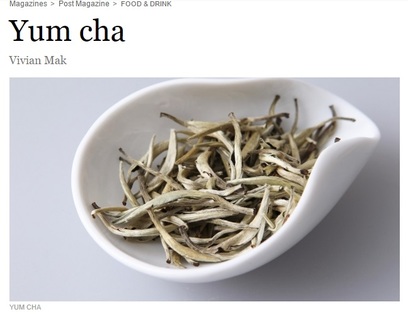White Teas
|
White Teas - Ageing Tastefully
In April I visited a farm in Fuding, Fujian province where they grow a highly versatile tea cultivar called da bai, the buds and leaves of which are used to produce green, white and red teas. Another noteworthy feature is that the buds, or "needles", are covered in silvery white hair. The white and green teas produced from these buds are called " bai hao yin zhen" in Chinese and "silver needle" in English. The white tea, however, is more commonly known as " shou mei" - " shou" meaning longevity and " mei" eyebrow. The name refers to the eyebrow of an elderly person and the needles do indeed resemble silvery white eyebrows. In Chinese culinary philosophy, consuming a plant or a bit of an animal that resembles a part of the human body is believed to strengthen that particular feature. In this instance, shou mei is associated with living to a ripe old age and is popular among the elderly. These silvery hairs serve a crucial purpose: needles bud during early spring, around March, and, since the region is at a high altitude, it can get very cold, so the hairs form a layer of insulation for the needle, like a fur coat. Secondly, moisture from dew drops can cause the needles to rot but the hair prevents this from happening. |
To produce white tea, buds are picked during the day and brought to the factory by farmers at dusk. In a process called withering, they are then layered on racks and air-dried at 30 degrees Celsius in a temperature-controlled room for 24 hours. The buds will turn from fresh green to greyish white, after which they are collected and piled in heaps to allow them to oxidise for another 24 to 72 hours; the longer the time, the sweeter and more mellow the taste. The most expensive such teas are naturally withered under the sun, but this is risky as the weather during the spring can be unstable.
This light-oxidised tea will produce a light yellowish brew with a clean, smooth and soothing taste. White tea is prized for its anti-oxidising and anti-ageing effects. From my experience, the gentle flavour of white tea is ideal for people looking for a cooling effect but who have weaker stomachs. It can be consumed at any time and by anybody, including children and pregnant or breastfeeding women. Its anti-inflammatory character is good for people with gum-ache or mouth ulcers. http://www.scmp.com/magazines/post-magazine/article/1283305/yum-cha |

